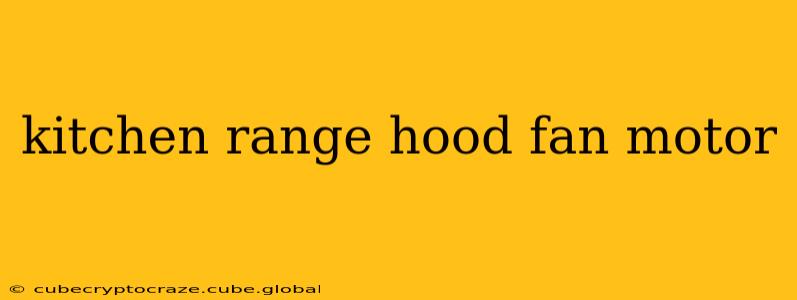A kitchen range hood's fan motor is the heart of the system, responsible for effectively removing smoke, grease, and odors from your cooking area. A malfunctioning motor can quickly turn your kitchen into an unpleasant, and potentially unhealthy, environment. This comprehensive guide will explore everything you need to know about kitchen range hood fan motors, from troubleshooting common problems to understanding replacement options and implementing preventative maintenance.
How Does a Kitchen Range Hood Fan Motor Work?
The fan motor within your range hood is typically an AC induction motor, although some newer models utilize DC motors for increased efficiency. It's a relatively simple device: electricity powers the motor, causing a spinning shaft to rotate the fan blades. This creates airflow, drawing air upwards and out of your kitchen through the ventilation system. The speed of the motor, and therefore the fan's power, is usually controlled via a switch or dial on the range hood itself. Different speed settings allow you to adjust the airflow to suit the intensity of your cooking.
What are the Common Problems with a Kitchen Range Hood Fan Motor?
Several issues can arise with a range hood fan motor, leading to reduced performance or complete failure. Let's address some of the most frequently encountered problems:
My Range Hood Fan Motor Isn't Working at All.
This is often caused by a blown fuse or tripped circuit breaker. Check your home's electrical panel to see if the circuit breaker corresponding to your range hood has tripped. If so, simply reset it. If the problem persists, the motor itself might be faulty, requiring replacement. A qualified electrician should be consulted if you're unsure how to proceed.
My Range Hood Fan Motor is Making Strange Noises.
Grinding, squealing, or humming noises usually indicate a problem with the motor bearings. Over time, these bearings can wear down, leading to increased friction and noise. In some cases, lubrication might temporarily alleviate the issue, but often, a motor replacement is the only long-term solution. A failing motor can also vibrate excessively, indicating internal damage.
My Range Hood Fan Motor is Running Weakly.
Reduced airflow could point to several problems: a clogged filter, a blocked ductwork system, or a failing motor. Start by cleaning or replacing the filter. If the issue persists, inspect the ductwork for obstructions. If everything else checks out, the motor might be weakening due to age or wear and tear, requiring a replacement.
My Range Hood Fan Motor is Overheating.
This is a serious issue that can potentially cause a fire. Overheating is usually caused by restricted airflow (due to a clogged filter or ductwork), a faulty motor, or an electrical problem. Immediately turn off the range hood and call a qualified electrician to diagnose and resolve the issue. Never attempt to operate an overheating motor.
How to Replace a Kitchen Range Hood Fan Motor?
Replacing a range hood fan motor is not a task for the faint of heart. It requires some basic electrical knowledge and comfort working with household appliances. Always disconnect the power supply before starting any repair work. Refer to your range hood's owner's manual for specific instructions. Generally, the process involves removing the hood's housing, disconnecting the old motor's wiring, and installing the new motor in its place, carefully matching the wiring connections. If you are uncomfortable with this process, it's best to hire a qualified technician.
How to Maintain a Kitchen Range Hood Fan Motor?
Regular maintenance can significantly extend the lifespan of your range hood's fan motor. Here are some key practices:
- Clean the filter regularly: A clogged filter restricts airflow, forcing the motor to work harder and potentially leading to overheating.
- Inspect the ductwork: Check for any blockages or obstructions in the ventilation system that could impede airflow.
- Lubricate the motor (if accessible): Some motor designs allow for lubrication of the bearings with a suitable lubricant. Consult your owner's manual for specifics.
What Size Fan Motor Do I Need?
The appropriate size for your range hood fan motor depends on the CFM (cubic feet per minute) rating recommended for your kitchen's size and cooking style. Check your range hood's specifications or consult a professional for guidance on selecting a replacement motor with the correct CFM rating. Using a motor that is too small will be insufficient, and one that is too large may be unnecessarily powerful and noisy.
By understanding the workings of your kitchen range hood fan motor and following these maintenance and troubleshooting tips, you can ensure efficient operation and extend its lifespan. Remember to prioritize safety and consult a qualified professional if you encounter any problems beyond your skillset.
